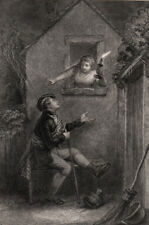In the popular tradition there are many ballads called “night visiting songs” with a stereotypical love adventure in which a young man (a soldier or a sailor or even a passing nobleman) for his attractiveness and gallantry, he manages to obtain the virtue of a young girl, entering her bedroom at night (usually on a rainy night). A popular version of Romeo’s night visit to Juliet’s balcony.
Nella tradizione popolare sono assai numerose le ballate dette “night visiting song” ovvero le avventure amorose abbastanza stereotipate in cui un giovanotto (un soldato o un marinaio o anche un nobiluomo di passaggio) per la sua avvenenza e galanteria, riesce a ottenere la virtù di una giovane ragazza, spesso intrufolandosi in camera sua nottetempo (in genere in una notte di pioggia). Una versione popolare della visita notturna di Romeo al balcone di Giulietta.

As I roved
Cold Blow And a Rainy Night (irish version)
Cold, haily, windy night
Drowsy Sleeper
I’m a rover seldom sober
Laird o’ Windy walls (scottish version)
Let me in this ae nicht (scottish version)
Let me in this ae night (Robert Burns)
Monymusk Lads
Night Visiting Song (irish version)
O Lassie, art thou Sleeping Yet (Robert Burns)
Oh, are ye sleepin’ Maggie?
The Night Visiting Song/ I Must Away Love
[ Roud 22568 ; Master title: Night Visiting Song ; G/D 4:783 ; Ballad Index Ord089 ; Mudcat 18991 ; trad.]
This is the traditional Irish version of a typical “night-visiting song”, however, to read between the lines, it is also a revenant ballad. The song takes up “ The Gray Cock ” without however the more directly explicit stanzas to the condition of ghost lover and to the cock’s call of the at dawn.
A very similar version: I’m a rover seldom sober
Questa è la versione irlandese tradizionale di una tipica “night-visiting song” tuttavia, a leggere tra le righe, e anche una revenant ballad. Nella sua struttura riprende “The Gray Cock” senza però le strofe più direttamente esplicite alla condizione di redivivo dell’amante e al canto del gallo all’alba
I=VI (1)
I must away now, I can no longer tarry
This morning’s tempest(2) I have to cross
I must be guided without a stumble
Into the arms I love the most
II
And when he came to his true love’s dwelling
He knelt down gently upon a stone (3)
And through her window he’s whispered lowly/Is my true love within at home?
III
Wake up, wake up love, it is thine own true lover
Wake up, wake up love, and let me in
For I am tired love and oh, so weary
And more than near drenched to the skin (4)
IV
She’s raised her off her down soft pillow
She’s raised her up and she’s let him in
And they were locked in each others arms
Until that long night (5) was past and gone
V
And when that long night was past and over
And when the small clouds began to grow
He’s taken her hand and they’ve kissed and parted
Then he saddled and mounted and away did go
(1) the first two stanzas take up the version of Mrs. Cecilia Costello “The Gray Cock“
(2) in Mrs Costello’s, the lover has to cross ‘the burning Thames’, while in Bill Cassidy’s it is ‘the burning mountains’,symbolising the difficulty of the dead returning
(3) those who come to visit from the Other Celtic World (where they lived according to the passage of time enchanted – one day at Fairy corresponds to a terrestrial year) not they must rest their feet on the ground because otherwise they are reached by the earth age
(4) in the ballad “The Gray Cock” William is wet because he presumably died drowned, here it is supposed to be bad weather; one of the pretexts shared in night songs to open the door to the sleeping girl is precisely that of the cold and rainy night
(5) Winter solstice night
Traduzione italiana Cattia Salto
I
Dove andare non posso restare più a lungo
la tempesta del giorno devo attraversare
Sarò guidato senza passi falsi
tra le braccia di chi amo tantissimo”
II
Quando venne alla dimora del suo vero amore,
si inginocchiò piano sulla pietra
e dalla finestra sussurrò piano
“Amore mio, sei in casa?”
III
“Sveglia, sveglia amore c’è qui il tuo innamorato,
Sveglia, sveglia amore, e fammi entrare
perchè sono stanco amore e affaticato
e inzuppato fino all’osso“
IV
Lei sollevò la testa dal suo morbido cuscino
si sollevò e lo lasciò entrare
e si tennero stretti tra e braccia uno dell’altro
finchè la lungo notte passò e finì
V
E quando quella lunga notte passò e finì
e quando le nuvolette iniziarono ad aumentare,
lui le prese la mano e si baciarono e si separarono
poi lui montò in sella e se ne andò via
NOTE
(1) [le prime due strofe riprendono la versione della signora Cecilia Costello “The Gray Cock”]
(2) [nella signora Costello, l’amante deve attraversare “il Tamigi che brucia”, mentre in Bill Cassidy sono “le montagne in fiamme”, a simboleggiare la difficoltà dei morti a ritornare tra i vivi]
(3) “Senza posare piede” sono espressioni che stanno a indicare una vecchia credenza popolare: coloro che vengono in visita dall’Altro Mondo Celtico (dove hanno vissuto secondo lo scorrere del tempo fatato – un giorno presso Fairy corrisponde ad un anno terrestre) non devono posare i piedi sul suolo perchè altrimenti vengono raggiunti dall’età terrestre
(4) ho tradotto l’espressione secondo l’equivalente frase idiomatica in italiano: nella ballata “The Grey Cock” William è bagnato perchè presumibilmente è morto annegato, qui si suppone che si tratti del cattivo tempo; uno dei pretesti condivisi nelle night songs per far aprire la porta alla fanciulla dormiente è proprio quello della notte fredda e piovosa.
(5) la notte è quella del solstizio d’inverno]
Folk Revival
https://mainlynorfolk.info/folk/songs/thenightvisitingsong.html
https://mudcat.org/thread.cfm?threadid=127524
https://mudcat.org/thread.cfm?threadid=126650
